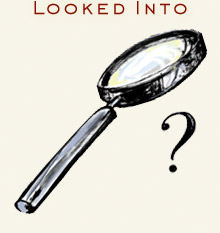Emdashes—Modern Times Between the Lines
The Basics:
About Emdashes | Email us
Ask the Librarians
Best of Emdashes: Hit Parade
A Web Comic: The Wavy Rule
Features & Columns:
Headline Shooter
On the Spot
Looked Into
Sempé Fi: Cover Art
Fact-Checkers Are Always in Vogue
Filed under: Looked Into Tagged: Blake Eskin, books, checkers, Ian Frazier, Jay McInerney, memoirs

At least whenever there’s a new fake-memoir scandal or a general railing against “irresponsible bloggers,” which becomes a meaningless phrase as soon as veteran journalists and, ah, newsmen start blogging up a storm.
At other times, fact-checkers are often forgotten, underpaid, and/or belittled as comical Bartlebys, toiling by lamplight with poor eyesight and minimal glitz and celebrating minute victories like the ones chronicled in “Are You Completely Bald?,” a brilliant old New Republic story about the art and agony of fact-checking that’s a lot harder to find than you’d think (and I’ve tried!). Fact-checkers are fussy ghosts, invoked respectfully in their absence and mildly teased for their pedantic obsessions just out of hearing range.*
Except at a few good magazines, primarily The New Yorker, where fact-checking is considered such a vital necessity that only the most well-rounded and world-savvy applicants are interviewed (and I mean interviewed). There’s a reason the checkers there are routinely cited by those outraged about the crimes of too-inventive writers. All fact-checkers grumble, in my experience, but there’s less cause for it when they have steady jobs, salaries, benefits, lore (confess, who would you rather be in Bright Lights, Big City—Nameless Narrator as he wakes up cold and lonely on the friendless street after too much coke, or NN in the library amid the reference volumes, making courageous international phone calls, and paging through, say, Ian Frazier’s notes to verify an intricate New Yorker profile?) and the faith of the majority of the writers whose stories they verify and strengthen.
Speaking of which, Slate’s Daniel Engber has assembled a funny collection of revelations about other well-known autobiographies, past, present, and future. Also on Slate, newyorker.com editor Blake Eskin’s reflection on fake memoirist Misha Defonseca, who was not brought up by wolves as she escaped the Holocaust, is worth reading. If you want a rigorously researched and compelling book, read Eskin’s memoir/exposé A Life in Pieces, whose accounts and investigations are all the more electrifying and poignant for being absolutely true.
While we’re telling panicky book publishers how to conduct their increasingly imperiled business (although the news that people like reading books on paper is somewhat comforting), could we add a politely voiced plea for the return of the publishing-house copy editor? Forget about made-up facts for a moment—I just want most of the words to be spelled right.
*By the way, as a former fact-checker myself, I can assure you that many of them are in fact adorable, attractive, and socially ept.




Comments
Hey, watch it: freelance copy editors actually catch 13.9% more errors on average than in-house copy editors. Which fact I haven’t checked, and which fact I thoroughly hope now enters the discourse as an unassailable fact, preferably via Wikipedia.
“Are You Completely Bald?†is wonderful. Panopticist.com is pretty wonderful too, come to think of it.
I deliberated over that wording so I wouldn’t exclude freelance copy editors, for obvious reasons! I mean any copy editors employed by publishing houses, don’t fret. Anyway, the majority of book copy editors (where they’re called on at all) are freelance these days, no?
Ha! Glad to hear it. I confess I took the terms “book publishers” and “publishing-house” to refer to e.g. Random House and not Conde Nast.
Free bonus factoid: Freelance editors are also 19% more physically attractive, on average.
Yes, I meant book-publisher-type book publishers! Most, if not all, of the Condé magazines have fact-checkers on staff. I read too many contemporary titles with errors in them, and I don’t mean the kind that the sleepless author misses in her last fast read, or computer-generated errors (though copy editors would have caught almost all of either kind). I’m preaching to the choir, I know!
Free bonus factoid: Freelance editors are also 19% more physically attractive, on average